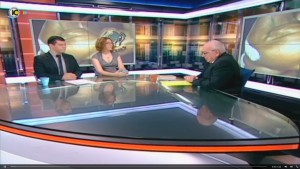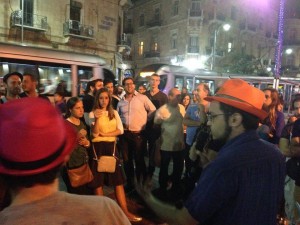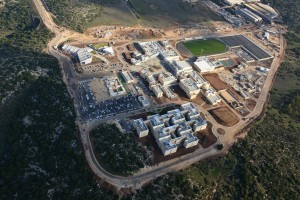Speaking in the Square – Getting the Word Out Beyond
Even more press coverage for the Speaking in the Square group, which we’ve been mentoring since last summer. (See here and here for more information.) This most recent string began with Ossnat Sharon’s August 8, 2015 column on Sichah Mekomit (Hebrew for local discussion). (Ossnat is one of the active core of volunteers who gather in Zion Square in Jerusalem’s downtown each week.) The English version, entitled, “The right-wing group trying to keep downtown Jerusalem Arab-free,” ran on August 21 on the sister site, +972mag.com. It describes the basics of the Lehava organization, an extremist organization whose followers often parade with racist chants in downtown Jerusalem mostly on Thursday and Saturday nights, and their weekly activities in downtown Jerusalem. This column led to an interview with Israel Channel 10’s veteran reporter, Yaron London on Sunday August 9, on the daily news magazine show, London et Kirshenbaum, which airs every weekday at 6 pm. The original column was also translated into Arabic and published on the Times of Israel Arabic site on August 12. Click here for the 5-minute interview, in Hebrew:
In it, like in the column, she describes the people in Lehava. “This is a phenomenon of youth,” she said. They are mostly youth and young people, looking for a meaningful way to, in their eyes, save the Jewish people from destruction. Some are youth at risk, while others are not. Some wear Lehava’s signature black and yellow T-shirts, and others do not (which makes it more difficult to identify them). While social service organizations and agencies are present in the Square to help youth at risk, the youth aren’t looking for their services. “These are youth who are looking do something, to create real change,” Ossnat added, and Lehava is the way that they’ve found to do it.
Speaking in the Square’s role, as she notes in the column, is “to make it difficult for them to operate unhindered.” With activists that run the gamut of political viewpoints, including secular and religious Jews, they keep an eye on the youth, more than the police, and let them know they’re being watched. They speak with them and passersby, and engage them in discussions that run deeper than one-line slogans. “We initiate a different kind of political discussion,” Ossnat explains in her Channel 10 interview. “We’re ensuring a moderate political presence [from all over the political spectrum], and not a nationalistic one. It has an effect that other kinds of activities don’t have…Something else is created [in the Square]. Something that dissipates the violence.”
We believe that the activities of Speaking in the Square have indeed changed the atmosphere in Zion Square, to one that truly enables Jerusalem’s extremely diverse populations to express themselves in a respectful manner. Many thanks to the UJA-Federation of New York and the Jerusalem Foundation for their support, which have enabled us to advance this project. Many thanks to these and other media outlets that have publicized Speaking in the Square’s work over the past several weeks. Join us in downtown Jerusalem on Thursday or Saturday nights!



